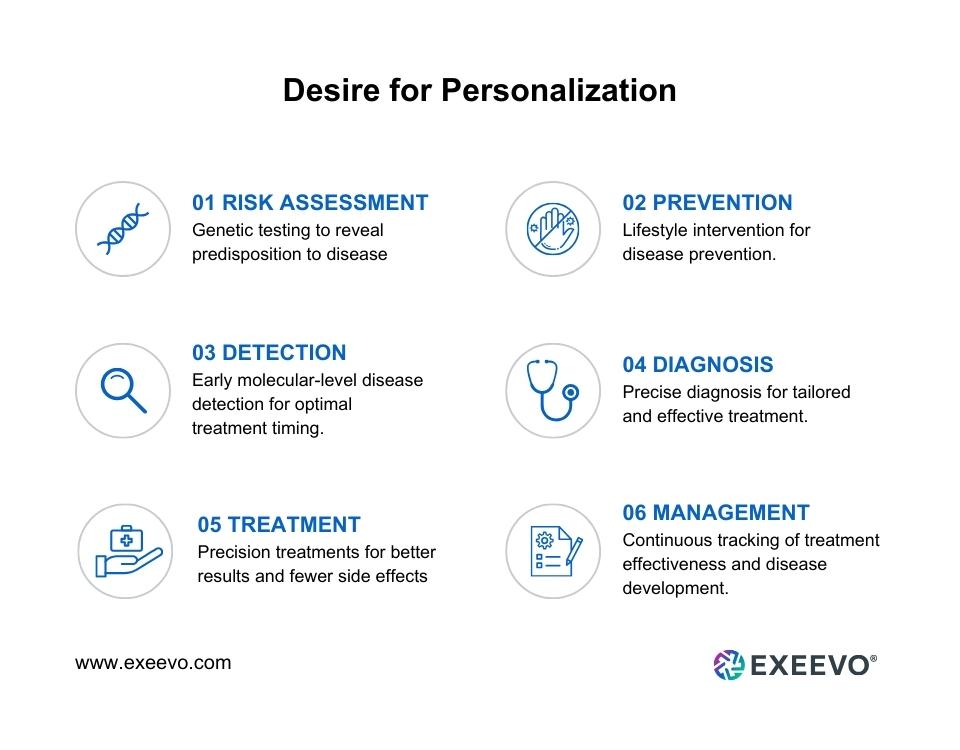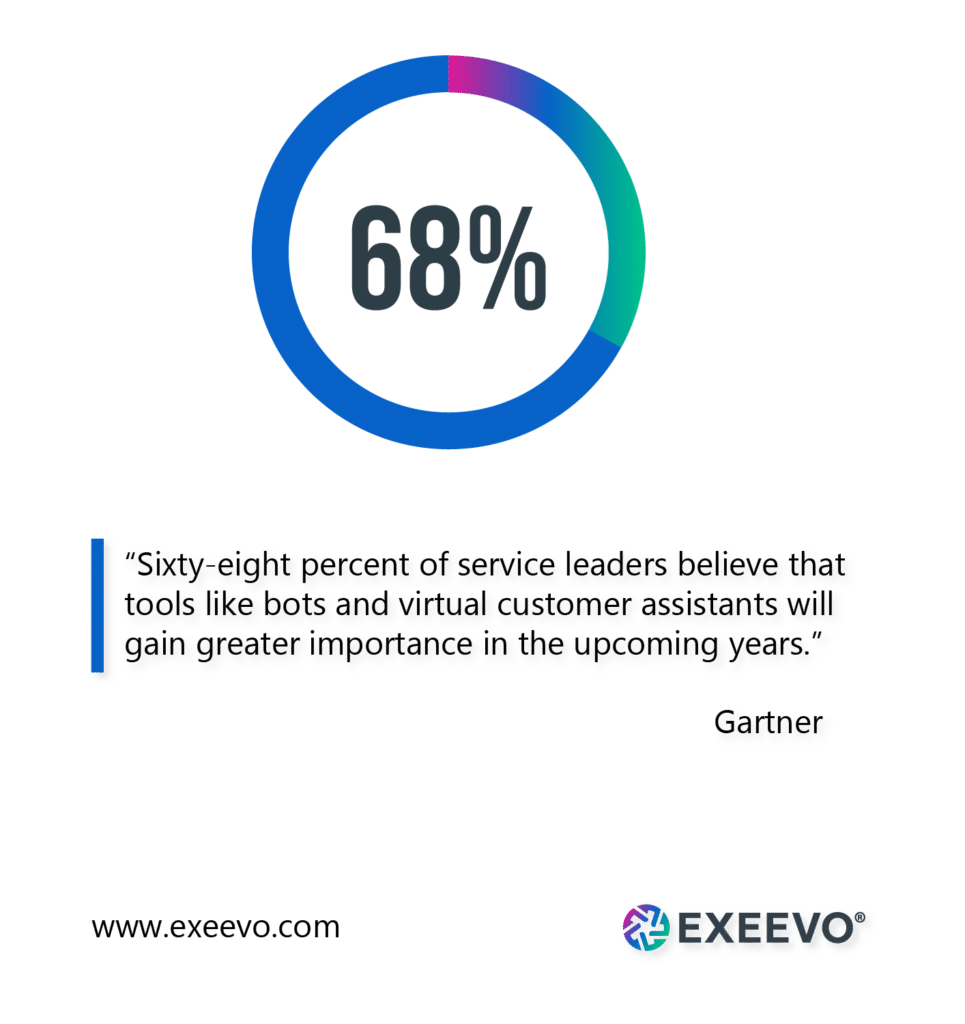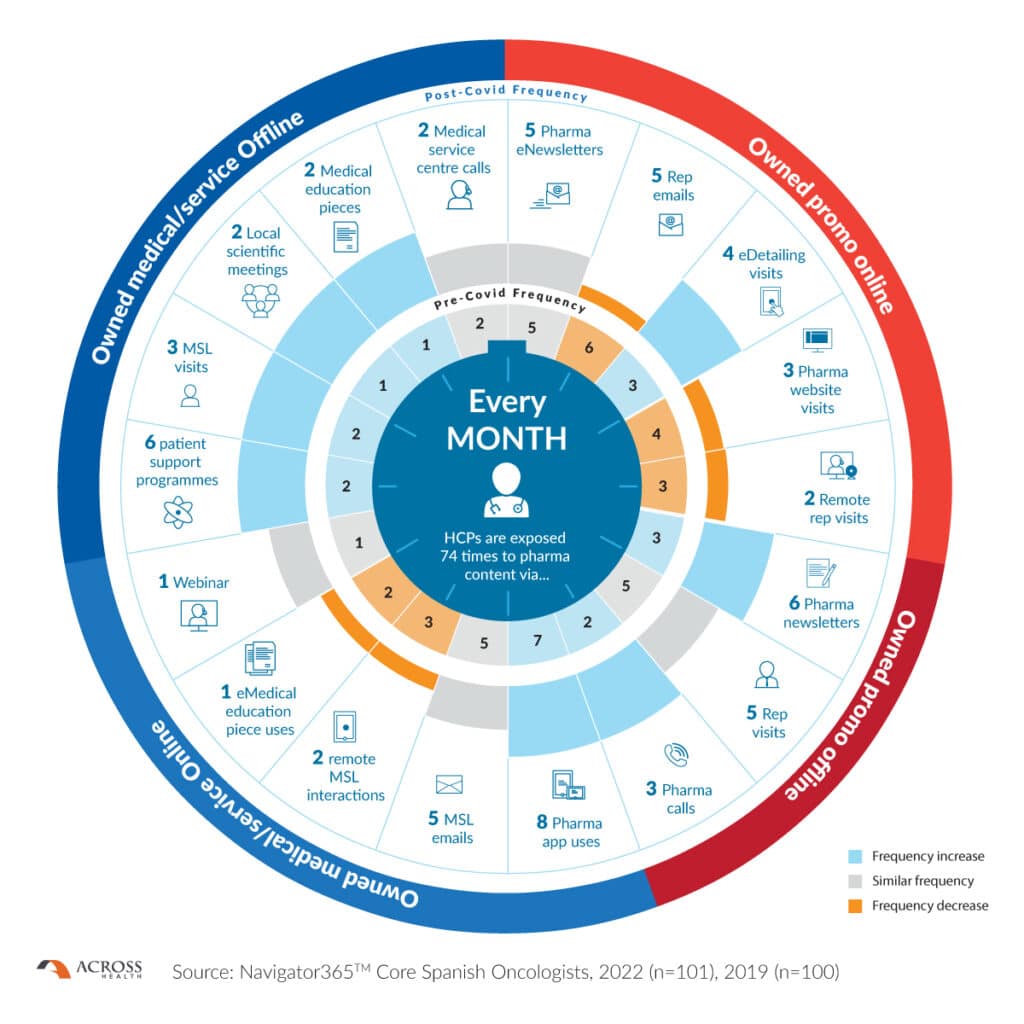The Ultimate Guide to Pharmaceutical Marketing in 2024 reveals how the pharmaceutical industry is poised for a significant shift. With new technological advancements and a growing emphasis on patient-focused demands, marketing practices will need to adapt to stay relevant and effective. This comprehensive guide will explore the strategies and innovations necessary to navigate these changes and succeed in the evolving landscape.
The surge in data in recent years from electronic health records, genomics, and wearables has reshaped marketing strategies. HCPs and marketing companies can now access these vast pools of information using advanced analytics. This data-rich environment has been pivotal in decision-making by pharmaceutical marketing. With the rise of artificial intelligence, machine learning, and the Internet of Things, they can craft more personalized and informed marketing campaigns.
Moreover, the industry’s trend toward patient-centricity emphasizes the importance of personalized medicine. As healthcare systems focus on value over volume, the spotlight is on tailored solutions for individual patient needs.
This guide offers an in-depth look into pharmaceutical marketing in 2024. It captures its progressing nature and the trends shaping its future.
Navigating Challenges in Pharma Marketing
Pharmaceutical marketing confronts a distinct set of challenges. Regulatory compliance comes at the top of this list. Every communication must align with strict guidelines to ensure patient safety and trust.
Additionally, you have to manage the public’s perception. Factors such as product recalls, or global health trends can influence public perception. Thus, it requires constant vigilance.
Strategies for Success
Overcoming these challenges demands a mix of well-defined strategies and best practices.
- Transparency is important.
- Clear, straightforward communication that breaks down complex medical terms can help bridge gaps.
- Educational campaigns can counter misconceptions and establish trust with the audience.
The Need for Agility
Marketers need more than static strategies in the fast-paced world of pharmaceuticals. Market trends, new scientific discoveries, and global health issues are changing the industry. It’s crucial to be agile and adaptable.
In an interview with Pharmexec, Slava Akmaev of Berg Analytics noted the pharmaceutical industry’s slower adoption of advanced analytics and AI compared to sectors like finance and IT.
However, McKinsey emphasizes that new techniques can streamline data flow and boost the development of effective medications. This shift towards embracing innovative technologies and analytics is becoming more evident in pharma.
Modern Solutions: Introducing Exeevo
Solutions like Exeevo have come to the forefront to address these challenges head-on. Device agnostic and built on the power of Microsoft Dynamics 365, Omnipresence CRM brings multiple business applications together in a unified system, coupled with advanced analytics to reveal insights, drive wiser decisions, and unleash new opportunities for commercial growth. Tools like Exeevo streamline complexities into actionable data and make decision-making more informed and responsive to industry dynamics.
Evolution of Pharmaceutical Marketing
The world of pharmaceutical marketing has been in flux. It is transitioning from a multichannel marketing approach to an omnichannel one. Historically, pharma organizations focused on products and their general impact on the medical industry. It sidelined a customer-centric approach.
Yet, a significant shift has emerged. Instead of focusing strategies on treatments alone, the emphasis has now moved to the customer.
Technical content overwhelms healthcare providers, patients, and other stakeholders. This content often needs to address their genuine needs. HCPs have felt this information overload, with 65% feeling “spammed” by pharma content.
Now, the call is clear:
- Pharma needs to focus on quality over quantity.
- It must deliver tailored content that addresses HCP concerns.
- The content should focus on collaboration, and highlighting customer value is the way forward.
COVID-19 further expedited this evolution. The pandemic put unprecedented pressure on HCPs and the pharmaceutical industry to push them towards rapid adaptability and forging a ‘better normal.’ As companies scrambled to adapt, the silver lining was a revived commitment to patient-centricity.
Organizations are now rethinking their technological and cultural strategies. They have to improve the customer experience and achieve an edge. As we forge ahead, the post-COVID pharma industry is here to stay with its heightened digital capabilities and renewed patient focus.
Modern Pharma Market: A Brief Overview
The pharmaceutical world is changing, and at the heart of this change is the role of the modern healthcare provider. Medical research isn’t the only thing that influences today’s providers. They also get influenced by:
- Advancing technology;
- Changing patient needs;
- The vast amount of data available to them.
One defining trait of the current pharma market is its strong focus on personalized care. Gone are the days of one-size-fits-all treatments. Providers today seek solutions tailored to individual patient needs. These treatments are based on the insights they gather from various data sources.
Businesses must align marketing efforts to meet the changing preferences of these providers. As providers pivot in response to the needs and behaviors of end HCPs, marketing strategies must keep pace.
The goal is to ensure that messaging and outreach remain relevant, engaging, and in tune with what providers value in this modern era.
PwC has presented a range of insights into the pharmaceutical industry’s future;
“Pharma 2020: Marketing the future” Insights. It highlights the rising influence of healthcare payers, providers, and patients. There’s a lot of stress on the need for a modernized marketing and commercial model. It also emphasizes that adopting these changes will:
- Improve cost-efficiency in marketing and commercial.
- Open up new opportunities within the industry.
- Foster increased loyalty among healthcare customers.
Informed Decision-Making
The digital age has ushered in plenty of online health information. It empowers HCPs in their practice. As we navigate this vast sea of information, there’s been a significant shift towards evidence-based data. This movement underscores the need for researched and peer-reviewed content. It ensures health decisions are rooted in dependable science.
For pharma marketing, this online surge presents both challenges and opportunities. While traditional digital ads might be losing their allure, an interesting trend emerges. 89% of physicians state that an email containing product information leaves a more lasting impact than standard digital ads.
This revelation becomes more significant, considering that 86% of doctors check their emails daily. As such, email marketing has emerged as a pivotal tool in the pharma industry. It has the reach and the potential to foster informed decision-making in the medical community.
Desire for Personalization
Modern HCPs now expect more than general solutions. They want personalized health offerings tailored to individual patient needs. Personalized patient support programs’ proven value and significant impact drive this shift. These programs address specific health challenges and patient profiles and can improve patient outcomes and satisfaction.
For pharma companies, this presents a golden opportunity. They can integrate personalized strategies into their marketing campaigns to connect more with HCPs. By offering custom solutions and highlighting individual patient success stories, pharma can meet the growing demand for personalization and stand out in a competitive market.

Ethical and Value-Driven
Today’s HCPs are growing in preference for brands that uphold ethical values. It’s not about the effectiveness of a drug or therapy; they want to collaborate with brands that share their commitment to doing good.
Environmental impact, corporate responsibility, and transparency are pivotal in shaping HCP choices. They are more inclined towards companies that show genuine concern for the planet and their community and maintain an open dialogue about their practices and intentions.
For pharma companies, this underscores the importance of aligning with these values. They can build trust and forge stronger connections with HCPs by championing ethical practices and clear communication.
5 Pillars of Effective Pharmaceutical Marketing
Pharmaceutical marketing has taken a new turn. It relies more on foundational strategies that deliver results. Life sciences marketers navigate a challenging setting where HCPs receive messages from different channels.
The digital shift has prompted pharmaceutical marketers to adapt and innovate. Tactics such as online reputation management and interactive media are essential.
Many changes are redefining how pharma connects with HCPs, including:
- Telehealth’s growth;
- Accurate NPI targeting;
- The increasing use of voice search;
- The role of key opinion leaders, combined with the efficiency of marketing automation
Understanding and applying these pillars of effective marketing is crucial to stand out.
1. Digital and Omnichannel Engagement
The pharmaceutical industry is currently witnessing a transition from multichannel to omnichannel strategies. This evolution offers a holistic and cohesive marketing approach. It ensures that every channel reaches its audience in a harmonized manner.
Take the case of a prominent medical device manufacturer. Due to scattered communication and information, they face the challenge of connecting with experts. Their salvation arrived in the form of Omnipresence CRM. This solution centralized all communication touchpoints. It offered a complete perspective on each engagement and enabled personalized insights to develop tailored engagement strategies.
We see a similar tale of success with SANOFI. Embracing OneCRM enabled SANOFI, an innovative global healthcare giant, to refine its commercial plans and magnify its engagement with healthcare professionals. This enterprise solution provided insightful intelligence throughout the omnichannel customer journey, aligning multiple customer-facing roles and enhancing their market strategy, which has driven commercial growth and success.
Based on a 2020 study by Accenture, 87% of HCPs preferred continuing virtual meetings or a hybrid of virtual and face-to-face interactions with pharmaceutical representatives, even post-pandemic.
Exeevo’s Omnipresence CRM emerges as an indispensable tool for pharma marketing automation. With its AI-driven insights and native Microsoft tool integrations, it’s evident why this platform is the top choice for modern pharmaceutical companies.
2. Leveraging Data, Insights and Analytics
In today’s pharmaceutical marketing arena, data reigns supreme. It forms the backbone of marketing decisions and enables marketers to create strategies rooted in evidence rather than mere intuition. As the saying goes, “What gets measured gets managed.” This couldn’t be truer in a world where every click, view, and interaction translates into valuable data-based insights.
Many tools and platforms, from advanced CRMs to specialized analytics software, facilitate data collection and analysis. These tools transform raw data into actionable insights. It helps marketers understand customer behavior, preferences, and trends.
For instance, platforms like Google Analytics and Tableau offer comprehensive views of user interactions, enabling refined targeting and better ROI, but only Exeevo’s Omnipresence CRM can take this data to merge it into one single source of truth, eliminating data inconsistencies and errors.
The benefits of data-driven marketing strategies are manifold. They lead to:
- Improved patient engagement
- Efficient resource allocation
- Optimized campaign performance.
Harnessing data, insights, and analytics ensures pharmaceutical marketing is impactful and evolving with the market’s needs.
3. Building HCP Trust Through Patient Engagement
Establishing genuine relationships with patients is vital for pharmaceutical marketing success. When patients feel understood and supported, their trust in HCPs grows. And where there’s trust, there’s stronger brand loyalty and better patient outcomes.
Engagement strategies, such as personalized omnichannel communication, interactive platforms, and responsive support systems, can make all the difference. Providing accurate and helpful content is essential, as HCPs are swamped with digital content daily. The collaboration between departments like commercial affairs, medical affairs, and marketing ensures content relevance and quality.
For instance, field teams interact directly with HCPs to gather critical insights about their needs. If they share this valuable information with marketing teams, they can better tailor the campaigns. It’ll strike the right chord with HCPs.
This is where CRM solutions enabling a 360° global and seamless cross-department collaboration are vital, unlike many older CRMs. They foster trust-building and help with patient-centric engagements. After all, trust isn’t built in a day; it’s a continuous effort to understand and cater to patient needs.
4. Strategic Collaborations and Partnerships
Strategic collaborations are significant in pharmaceutical marketing. They act as catalysts to extend a company’s reach and boost its credibility. Joining forces with reputable partners allows companies to:
- Discover new audiences;
- Share resources;
- Benefit from the expertise of their collaborators.
One notable partnership is between pharmaceutical giants Pfizer and BioNTech. The collaboration resulted in the rapid development and distribution of a COVID-19 vaccine. Their combined efforts showcased how collaborations can accelerate innovation and address pressing global health challenges.
Such partnerships offer mutual benefits;
- Companies can pool their resources to achieve shared goals more efficiently.
- Collaborations often bring together diverse expertise, which leads to richer insights and more robust solutions.
- Pharmaceutical companies can align with other respected entities to elevate their brands.
5. Ethical Marketing: A Non-Negotiable
Upholding ethical standards is essential in pharmaceutical marketing. As an industry that directly influences health and well-being, there’s a responsibility to ensure honesty, clarity and fairness in all promotional activities.
Unethical marketing practices can have serious consequences. Misleading information can harm patient safety, decrease trust in healthcare providers, and bring about legal challenges. The negative effects can damage a company’s image and future success.
Ethical marketing has many benefits. It builds consumer trust, enhancing a company’s position in the market. Customers tend to support and stay loyal to brands that act responsibly. Over time, sticking to ethical practices in pharmaceutical marketing helps meet the necessary standards. It creates a foundation of trust and respect in a competitive industry.
Emerging Trends and The Road Ahead
The pharma marketing world sees new daily trends that are reshaping its future. One game-changing trend is using AI in Life Sciences.
A study from Gartner reveals, “Sixty-eight percent of service leaders believe that tools like bots and virtual customer assistants will gain greater importance in the upcoming years.” The clock is ticking for organizations yet to venture into this space.

While AI is a significant development, it’s just one branch in the growing tree of pharmaceutical marketing. From an end-to-end partner ecosystem to personalized customer journeys, marketing in the Life Sciences industry has much to offer in upcoming years.
Are you curious about the evolving role of marketing in Life Sciences? Immerse yourself in this trend and explore the future of pharmaceutical marketing here. And if you want to discuss how these insights can benefit your organization, contact Exeevo.

